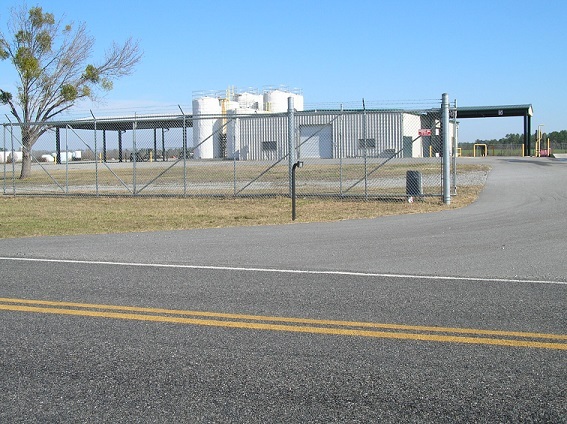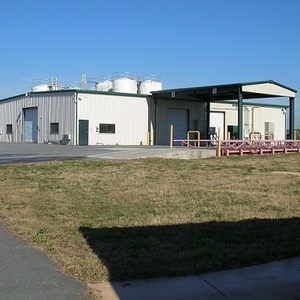Georgia biodiesel project moves closer to USDA loan guarantee



Photo: Ramon Benavides, Global Renewable Strategies and Consulting LLC
June 9, 2017
BY Ron Kotrba
Smisson-Mathis Energy LLC, a joint venture between The Smisson Group of Macon, Georgia, and Tactical Fabrication LLC, has been selected by USDA to initiate Phase 2 of the Section 9003 program for the company’s $6.75 million enzymatic biodiesel project in Laurens County, Georgia. SME received its so-called “Green Light Letter” from USDA’s biorefinery assistance loan guarantee program after applying April 3.
Phase 1 of the process involved providing USDA a rigorous feasibility study, performed by Global Renewable Strategies and Consulting LLC, to indicate a solid business plan and technology selection. Phase 2 includes a lender’s analysis by the prospective bank and a USDA environmental assessment, according to Jill Hamilton, founder of Sustainable Energy Strategies Inc., a company hired to help with the award process.
Unlike grants or other government incentives that may provide funding upfront, the Section 9003 biorefinery assistance loan guarantee program provides banks with assurance that if a biodiesel project falters on its loan repayment obligations for whatever unforeseen reason, the government will repay the lender up to 80 percent of the loan. In this case, the loan amount sought is $5.4 million, so USDA would back up to 80 percent of that $5.4 million. Hamilton told Biodiesel Magazine that such guarantees can help projects negotiate better interest rates with banks.
Advertisement
A 120-day technology demonstration is also part of the Phase 2 process, according to SME CEO Franklin Mathis.
“This demonstration process began several months ago and will end July 1,” Mathis said. “We are achieving current ASTM D6751 requirements and they are sustainable. We are starting the environmental permitting process for our new production facility and do not anticipate any issues. Once a Notice of Construction is issued [by USDA], we will begin renovations at our recently acquired facility and should be online for shakedowns in December, with full production by July 2018.”
In May, Biodiesel Magazine reported that SME’s new production facility will use liquid enzymatic technology for conversion of brown grease to biodiesel. A small pilot plant in Dublin, Georgia, scaled at 75,000 to 100,000 gallons a year, has been used as a research facility to demonstrate the process. The enzymatic plant will be scaled initially at 1 MMgy and, once operational, the team will expand capacity to 5 MMgy.
“We are pleased with our USDA selection and wish to thank Sustainable Energy Strategies Inc. and Global Renewable Strategies and Consulting LLC for their hard work in preparation for this award,” said SME Project Manager Ben Smisson. “We have a significant workload ahead of us and our team is fully prepared and qualified to move forward expeditiously.”
Advertisement
GRSAC President Ramon Benavides told Biodiesel Magazine that his company’s development of a new biodiesel profitability model was integral in SME getting the green light from USDA to begin Phase 2 of program.
“Our new model can provide a 30-year forecast, and it demonstrated that this project is profitable even without the federal tax credit since brown grease is priced at a significant discount to yellow grease,” Benavides said. “The model creates failure scenarios, and provides management a tool to mitigate those impacts to establish a successful road map.”
“I’m pleased to see USDA support cutting-edge biodiesel technology like this,” Hamilton said. “We would like to see more biodiesel companies use these programs. In almost all cases, we can find opportunities for them. And for those companies who may have trouble coming up with their 20 percent obligation through equity or capital, we can find bridge-gap loans or other means to help them.”
Related Stories
The International Air Transport Association has established the Civil Aviation Decarbonization Organization to manage the IATA-developed Sustainable Aviation Fuel (SAF) Registry when it is released.
LRQA, the leading global assurance partner backed by Goldman Sachs Alternatives, has acquired EcoEngineers, a U.S.-based consulting, auditing and advisory firm with an exclusive focus on the energy transition.
The U.S. EPA on March 24 asked the U.S. District Court for the District of Columbia to dismiss a lawsuit filed by biofuel groups last year regarding the agency’s failure to meet the statutory deadline to promulgate 2026 RFS RVOs.
The USDA on March 25 announced it will release previously obligated funding under the Rural Energy for America Program To receive the funds, applicants will be required to remove “harmful DEIA and “far-left climate features” from project proposals.
BIO, in partnership with Kearney, a global management consulting firm, on March 24 released a report showing the U.S. bioeconomy currently contributes $210 billion in direct economic impact to the U.S. economy, excluding healthcare.
Upcoming Events










